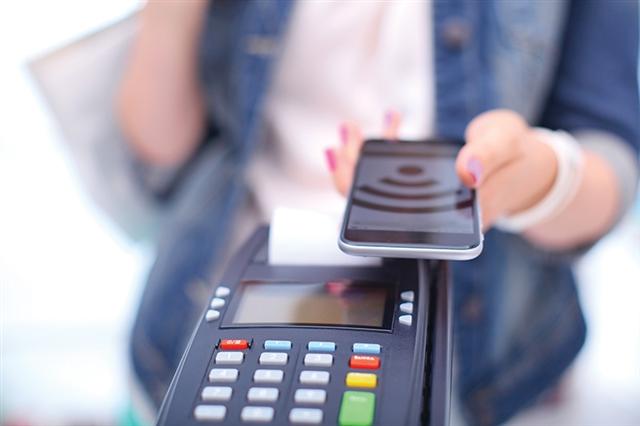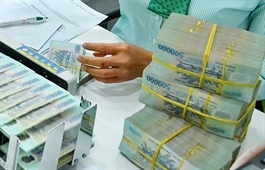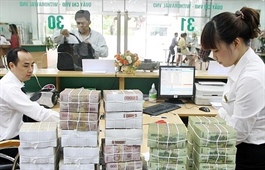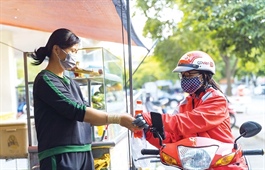Banks’ support desired for mobile payments
Banks’ support desired for mobile payments
New approaches, especially regarding activities of banks, are required to boost the reach of mobile money agents and expand financial inclusion in Vietnam.

Vietnam boasts nearly 130 mobile phone subscriptions Photo: Shutterstock
|
As mobile money is planned to be deployed this month on a national scale, many question the role of banks and network agents and if it will be a destructive or mutually beneficial relationship.
“The two most essential functions of a bank are capital mobilisation and lending, which do not link to mobile money operations – whose services are often categorised as small-sized transactions. In short, “each minds his own business”. Somehow, the adoption of mobile money can accelerate cashless payment ratio in the country. So basically, the case represents a win-win situation,” said economist Can Van Luc.
Le Dinh Ngoc, representative of the Department of Finance and Banking under the Ministry of Finance, reaffirmed, “The assistance from banks is of utmost importance for the upcoming mobile money adoption. The whole amount put into mobile money should be deposited at banks in a 1:1 proportion in a bid to protect payment purposes.”
Market watchdogs also stated banks should control the mobile money cashflow, as well as set a string of regulations to prevent money laundering, terrorism financing or fraudulent cases.
The control by banks in mobile money can be either preventive which reduces the likelihood of fraudulent activities or detective which monitors and reports trends or activities that have already happened.
Thus, at the initial stage, it is highly likely only state-owned lenders would be responsible for co-operating with mobile money providers, such as Vietcombank, VietinBank, Agribank, or BIDV.
Furthermore, since military-run telecommunication firm Viettel has been qualified by the State Bank of Vietnam (SBV) to implement such services together with VNPT, Military Bank (MB) is receiving much attention of joining the game.
“After our scheme gets the go-ahead, we will quickly make revisions if necessary and launch the service. Notably, not only smartphones using 3G and 4G, even common handsets using 2G will be able to deploy mobile money service,” said Viettel Digital CEO Pham Trung Kien.
On the other hand, the presence of foreign investors is still questionable, as mobile money services relate to not only payment but also national security. The state has not yet disclosed any involved overseas investors, but rumour has it some high-profile names would join in the game.
The case of Bangladesh is a perfect example. The Economist reported almost 60 per cent of mobile money transactions goes through bKash, which is owned by BRAC bank, a local financial institution, and several grand foreign investors, including the World Bank’s private-sector arm; an affiliate of Alibaba, a giant Chinese e-commerce firm; and the Bill & Melinda Gates Foundation, an enormous American charity. It has more than 30 million customers across the nation, and the number says it all.
A BIDV report revealed that mobile money has been actively present in 90 countries with nearly 870 million registered accounts, 272 apps, and a daily transaction revenue averaging $1.3 billion.
Vietnam has around 129.5 million mobile phone subscriptions, around half of them are using 3G and 4G, stated an SBV report released last November. Researchers at Boston Consulting Group noted banks have traditionally offered these cash-in/cash-out services via ATMs and bank branches. But these solutions are often too expensive to make economic sense in markets that have low-income, low-density populations. For digital financial services to take off in developing markets, where virtually all transactions are still conducted in cash, people need access to physical infrastructure to safely and seamlessly deposit and withdraw cash.
That said, mobile money boasts vast potentials to the financial system of millions of Vietnamese who lack access to formal bank services. Imaging how lucrative and convenient it will be if mobile money providers were shaking hands with traditional bank branches to give more customer access to digital payments or even remittances.
“Given Vietnam’s high mobile penetration rate and large unbanked population, mobile money could bring basic financial services to those living in remote areas and those with no way to access traditional banking services. Besides this, mobile transactions in Vietnam are expected to increase by 400 per cent by 2025,” Riddhi Dutta, regional head for ASEAN and India of software company Backbase, told VIR.
This is further validated as according to the SBV, 63 per cent of Vietnamese adults possess a bank account – a ratio that, as indicated by the World Bank, was only 40 per cent at the end of 2017 – yet in 2019, the number of mobile phone subscriptions reached 129.5 million, with half of them owning smartphones – figures on par with Malaysia, and higher than Thailand, Indonesia, and the Philippines.
Notably, the infrastructure required to deploy mobile money in Vietnam has been improving – an ace up in telecommunications providers’ sleeves.






















